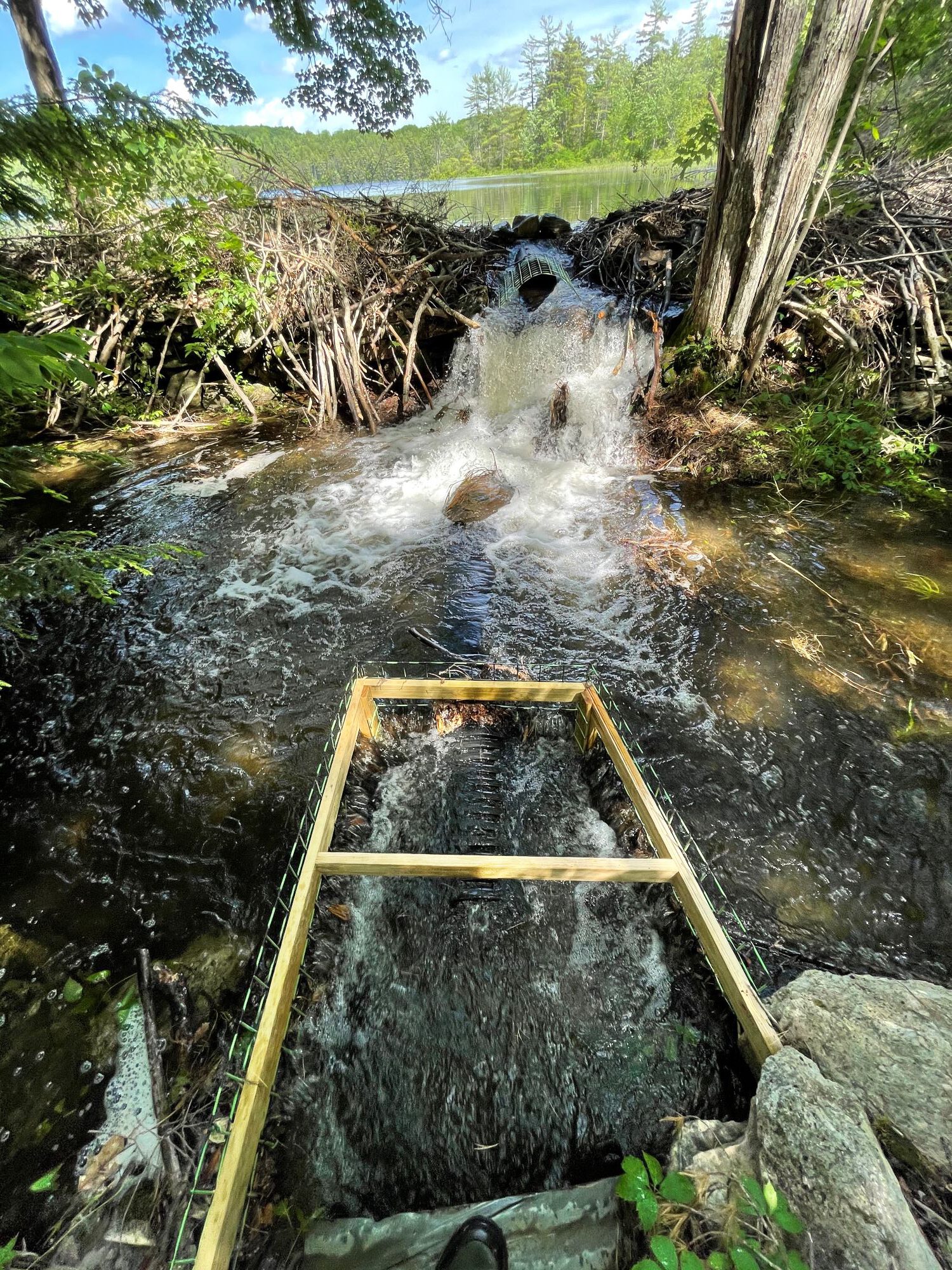Bangor Daily News
by Aislinn Sarnacki October 10, 2017
Printed Article
Knee-deep in muddy water, Skip Lisle wrestled with a metal fence, a key component of his invention, the Beaver Deceiver. On the morning of Sept. 29, deep in the woods of northeast Maine, Lisle pieced together the simple, durable device that he designed with one goal: trick the beavers, and in doing so, save the beavers.
Constructed on the upstream end of a road culvert, the device would prevent beavers from damming up the culvert and flooding the gravel road, something that is extremely common problem throughout the state.
“You hear about beavers being industrious and loving to work,” Lisle said. “That’s a myth. They’ll always choose the easiest damming site.”
Where humans see a gravel road with a culvert in it, beavers see a dirt dam with a tiny hole in it. As water rushes through the culvert, it calls to these natural builders, and their instinct is to “repair the dam,” block the culvert with sticks and mud so the area will flood, expanding their habitat. It’s what beavers do … unless you can somehow stop them.
That’s where the Beaver Deceiver comes in.
“It’s essentially a two part system,” Lisle said. “It’s a fence to prevent beavers from directly clogging the culvert — but there’s not a whole lot of deception in a simple fence because usually the beavers will just dam around it — so that’s paired with a pipe system that goes out to another fence or filter on the end of that pipe. And that’s where the water is being snuck away from the beavers. That’s how they’re deceived.”
The only other viable way to prevent beavers from clogging culverts and destroying roads is by removing them from the area entirely, and that is almost always achieved through lethal means.
That’s the last thing Lisle wants.
Growing up in rural Vermont in the 1970s, Lisle witnessed how beavers can rapidly change a landscape to benefit many other species of wildlife. On his family’s land, beavers constructed a dam across a waterway, creating a pond that expanded over the years, attracting a wide variety of animals to his backyard.
“There were so many animals using it, different species, and that stuck with me my whole life,” Lisle said.
When Lisle was about 15 years old, the local beavers started damming up a culvert on a town road that ran through his family’s land. He realized that he needed to stop them or the road would soon be flooded. If someone else took action, the beavers would likely be killed. So he took charge and got creative.
“I actually stole some of my father’s old garden fence,” Lisle said, “and just built a crude fence in the culvert. And that’s when it all began.”
Constructing a fence around a culvert is the first step in building what Lisle would later call a Beaver Deceiver. But that invention was years in the making.
After receiving a bachelor’s degree in geography from Plymouth State University in New Hampshire, Lisle worked for ten years in construction, mainly doing painting and carpentry work. He then returned to school to earn a master’s degree in wildlife management from University of Maine in Orono. His thesis was on beavers, and more specifically, the wetland habitats they create.
“Wildlife management has always been my calling,” Lisle said. “I just didn’t answer it at first.”
When Lisle graduated from the University of Maine in 1995, he was hired as the wildlife biologist for the Penobscot Indian Nation, and he was the perfect person for the job. Among other things, the Penobscot Nation needed help with beavers flooding roads on tribal land.
“So many of their culverts were clogged, and the roads were washing out, so they told me to go out there and try to figure something out,” Lisle said. “And I said, ‘Yeah. No problem,’ full of youthful confidence. But I’m still at it 22 years later, and its still a challenge.”
Over the years, Lisle experimented, developing different designs to protect culverts throughout the Penobscot Nation’s 150,000 acres of land. Drawing on his experience in carpentry and knowledge about wildlife management, he devised the modern-day Beaver Deceiver, which includes a 15-inch pipe connecting two mesh enclosures. This design confounds beavers, filtering water through the culvert despite their best efforts to stop it.
In 2001, Lisle founded Beaver Deceivers International, and since then, he has traveled throughout the country unclogging and protecting culverts, roads and as a result, beavers.
“My truck has just under 300,000 miles on it, and it’s going strong,” he said.
He’s also traveled overseas to give presentations at the European Beaver Symposium, and construct a Beaver Deceiver on a railroad culvert in eastern Poland.
But the one-man business is far from glamorous, he said. It involves a lot of traveling, seasonal lulls and tough physical labor that includes Lisle crawling into culverts and wading through muddy water.
Nevertheless, it’s worth it, because Lisle knows that the alternative is killing beavers. And according to him, that is rarely a long term solution to the problem.
“Beavers are great explorers of the landscape and are always looking for vacant high-quality habitats,” Lisle said. “If you kill the beavers at a culvert site, you have a vacant high-quality habitat, a beaver magnet in other words.”
On Sept. 29, Lisle was working to protect one of those magnets just southeast of Lincoln. Though he moved back to Vermont with his wife several years ago, he returns to Maine a few times every year to work on Penobscot Indian National land.
In Vermont, he lives in his childhood home, which is inherited. And when he looks out the window, he sees a healthy wetland habitat that generations of beavers on the property have built up over the past 40 years.
“That’s what I know I’m fighting for,” Lisle said. “That knowledge and conviction of their value really has gotten me through the hard times, when I’m really struggling. That keeps me going.”
Aislinn is a Bangor Daily News reporter for the Outdoors pages, focusing on outdoor recreation and Maine wildlife. Visit her main blog at actoutwithaislinn.bangordailynews.com.
© 2021 Bangor Publishing Company

